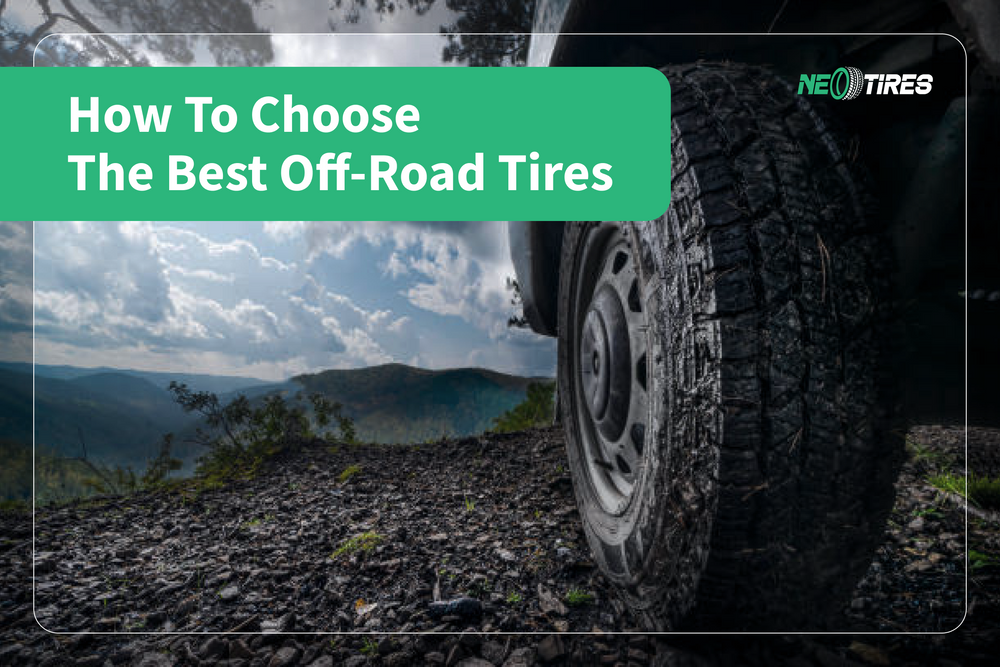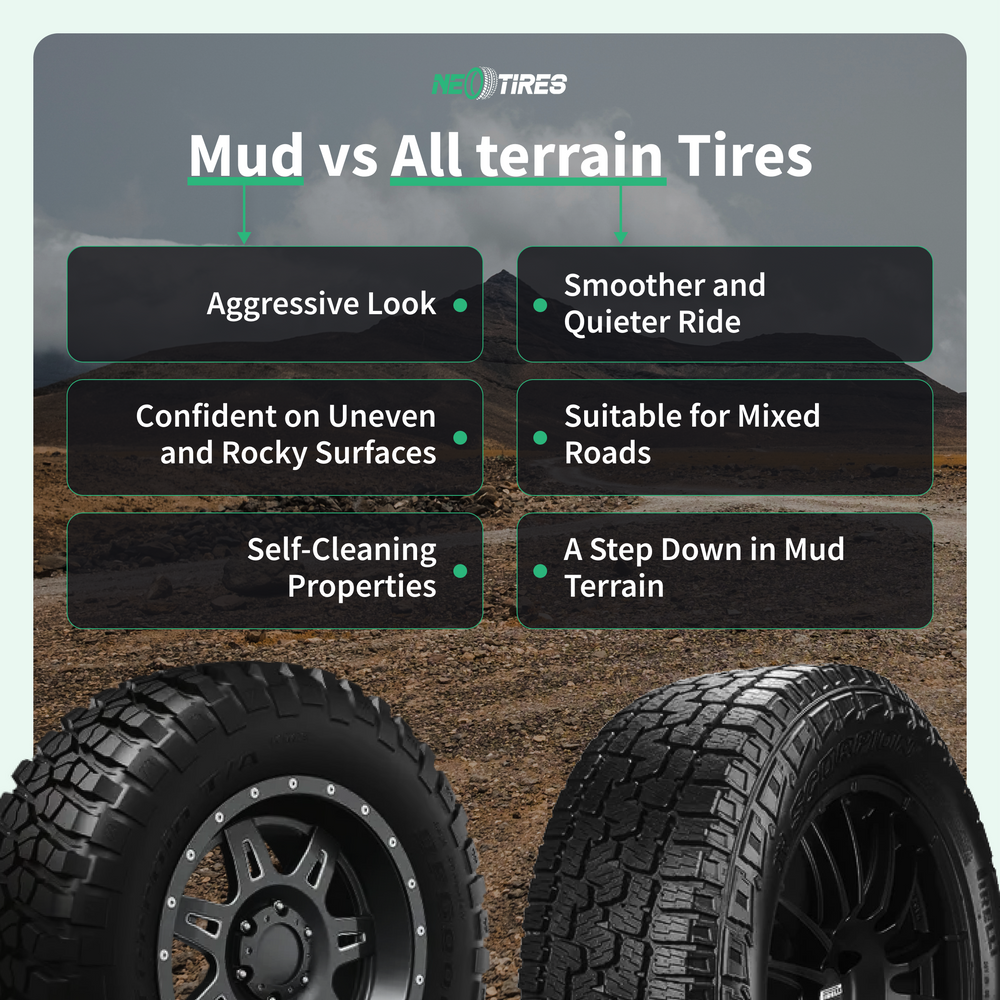Today we are talking about off-road tires - huge road companions that help us go through any road challenges bravely. How many of us love adventurous travels where we completely detach ourselves from overcrowded cities? And where there is an adventure, there must always be an SUV or crossover to accompany us in the challenge of being closer to nature. How should you equip your crossover so that it can face different types of roads, without affecting the grip?
We all know what these off-road nice and muscle guys look like heavy-duty treat patterns, phenomenally-resistant sidewalls, as well as performant traction abilities to easily withstand mud and road sediments. It is precisely this type of tire that gets the vehicle out of trouble instead of being stuck in a forest full of mud.
Off Road Tires: When To Get Them?
When it comes time to decide between an off-road and an all-season tire, the former will withstand exceptionally well the aggressive road conditions. However, do not rush to decide in its favor because there are also certain shortcomings that you must be aware of.
If you oscillate between an all-season and off-road for pavement conditions, forget about off-road tires! They will wear much faster on the pavement. Off-road tires love the drive, the challenges, and the extreme circumstances. Yes, you will likely get tired at any moment due to the noise they produce. But this is the price for their incomparable resistance.
Off-road tires are not available for all types of vehicles. They can be mounted on cars with large bodies, whose weight and traction can cope with the complexity of their architecture. At the same time, the automotive industry is developing rapidly and some manufacturers are producing options for sedans and similar passenger cars.
Today, however, we are talking specifically about off-road tires for crossovers and SUVs. Let's see together how we can distinguish different quality off-road tires and what aspects we should take into consideration to choose what we need. Let's fasten the belt and hit the road!
What Makes A Tire Off-Road?
Manufacturers do not produce all off-road tires equally. And most likely, every experienced driver will want a certain type of off-road tire. Everything depends on the personal needs of each driver. What I think looks and performs great in the best set of off-road tires, may not look and perform great for you, simply because we might have different needs.
So the first thing you have to start with is a little research inside yourself. Imaginarily project your trip with a car on off-road tires and try to understand what you are looking for in it and what is superfluous.
Off-Road Tire Specific Features
The general characteristic and strong argument for off-road tires is their durability and the traction they provide. When we say about durability, we mean the one in extreme conditions and not the one on paved roads. On the other extreme, you should not expect great comfort with these tires. This aspect is not integrated into their DNA in the production process.
Off-Road Tires For Daily Driving
How suitable are off-road tires for usual daily rides? How much rolling on the pavement is okay for an off-road vehicle? Are off-road tires the same as all-season?
Specialists claim that tires are extremely good when they meet the daily needs of drivers. If we relate this idea to off-road tires, they are unlikely to perform well on highways (for example) because their purpose is totally the opposite. If the daily necessity of a driver involves rolling long distances on highways, then an all-season tire would suit him much better.
Therefore, good off-road tires will be those that will get you out of trouble in OFF-ROAD conditions, exactly as their name suggests. The rest are just small details that you have to take into account.
The 2 Common Types Of Off-Road Tires
Off-road tires fall into 2 basic types. It is about mud-terrain, recognized by the abbreviation M/T, and all-terrain, known by the abbreviation A/T.
While the purpose of both is almost similar, there still are some differences between them. Speaking about the all-terrain option, we are actually referring to a compromise between the mud-terrain and all-season versions. That is, the manufacturers produce these tires with on-road driving performance in mind.
On the other hand, the mud-terrain alternative prioritizes off-road driving, generating less performance in on-road conditions.
Starting from this premise, it is easy to choose the type of tire according to your needs. If you need more than what an all-season set offers, all-terrain tires will do perfectly. However, if your road is more off than on, choose accordingly. It is important to choose the tire type corresponding to the road, otherwise, you risk impacting tire wear. If you opt for a mud-terrain tire in the context of a wet road, expect an early worn tread and a much more compromised performance.
High-Quality VS Low-Quality Off-Road Tires
Once you decide on a set of off-road tires, you definitely need a high-performance set that withstands all challenges. Some suggestions can help you make the right choice. The first aspect that matters a lot is the differentiation between off-road tires with genuine performance and those with aesthetic performance. It is very easy to fall prey to those with an aesthetic performance. The manufacturers make them look robust on the outside, without endowing them with the necessary durability and performance that they should normally have.
For this reason, we recommend opting for tires from reliable manufacturers. Check the source of the tires by all possible methods to make sure that their performance is not just cosmetic. Most of the time, such off-road tires are part of the most affordable category.
Off-road tires available at a fairly friendly average price usually offer higher quality and a mediocre performance for all-terrain and mud-terrain roads. While these are not always the best options, they at least perform better than off-road tires with cosmetic performance.
Considering your financial possibilities, of course, the reputable brand off-road tires are the most promising. They fully meet the performance standards, leaving no room for compromised efficiency.
What Makes Off-Road Tires Different From Winter And A/S Tires?
Comparing off-road with all-season/winter tires, manufacturers surely have comfort in mind when producing all-season/winter versions. As we mentioned at the beginning, comfort is not the number one priority of off-road tires. However, it is one of the priorities for all-season and winter versions. In this context, a driver will feel stiffer handling with off-road wheels in contrast to the smoother handling with all-season tires.
Another difference is the power of the noise. Off-road tires inhibit noise much more poorly than all-season tires. And the difference is pretty obvious. However, I must admit that the motor industry has made tremendous progress lately. Several manufacturers have recently advanced in the development of systems to inhibit noise in off-road tires. At the same time, the competition between manufacturers also aims at their level of comfort. So, I do not rule out that soon we will have off-roads no less comfortable than all-season tires.
We must also mention that off-road tires negatively influence fuel consumption. However, this shortcoming also tends to be resolved soon because manufacturers are fighting to create off-roads as fuel-efficient as possible.
Treadwear Ratings
For now, the off-road UTQG tire ratings are lower than the all-season ones. This means that they will wear out a bit faster. The modern automotive industry offers some options as resistant to treadwear as those of all-season tires. But they are still not very popular.
Weather Dependence
A common aspect between all-season and off-road tires is the fact that drivers can wear them all year round. However, specialists recommend the use of an additional set of winter tires for those who live in areas with long, icy, and cold winters. Like the all-season tires, the off-road ones do not cope with extreme conditions in the same way as the winter tires.
On the other hand, all-terrain tires are a great option for weather conditions with a lot of snow. The aggressive architecture of the tread blocks offers phenomenal grip both in mud and snow. However, if the snow has a chance to turn into ice, winter tires will do better.
Off-Road Tire Size
Most off-road tires are quite generous in size. Their large size contributes beneficially to the vehicle's traction and performance. However, it is a big mistake when off-road tires are not proportional to the vehicle body. Tires that are too big or too small lead to a severe impact on the driving experience. And taking into account that you are in a quite dangerous road environment, you can put your life in danger.
The disproportionality between the off-road tires and the car body leads to increased fuel consumption. But this is by no means the most serious consequence. The more serious consequences include but are not limited to a delayed response to steering wheel commands, compromised control over vehicle handling, as well as poor overall driving experience.
In this context, you need to know the recommendations of your car manufacturer regarding off-road tires. Always take into account the diameter of your wheel, which must match the diameter of the tire. Also, consider the load rating of the tires that the car manufacturer allows.
Taller VS Wider Off-Road Tires
Many adventurers find it funny to opt for taller and wider off-road vehicles for their 4-wheel friends. According to many enthusiasts, the taller the crossover or SUV, the better it looks. As for the width of the off-road tire, it indeed improves the contact patch.
However, many of these enthusiasts avoid taking into account the adverse effects of these choices. An inappropriate tire height and width will necessarily increase fuel consumption. And let's not forget that off-roaders are quite fuel-demanding even without that.
As in the case of a regular vehicle with much too high tires, a crossover with high off-roaders will generate inaccuracies in the speed calculation. The dashboard will indicate erroneous data. At the same time, the noise produced by the wheels will be much more acute due to the mismatching of the off-roaders' width and height.
Considering all these negative aspects, the specialists' suggestion is to avoid experiments that contradict the manufacturers' recommendations. If you want to have a more vivid experience from your off-roaders, maybe you should migrate to some more aggressive tire treads. But never experiment with inappropriate sizes and standards.
Off-Road Tires: FAQs
Is It Worth Buying Off-Road Tires?
Off-road tires are welcome if you love to explore unknown roads. These are able to reach places where traditional tires cannot. Their benefit consists of their improved rolling resistance and phenomenal traction, which makes them easily face extreme road conditions. However, you must know that you will experience a lot of noise because these are not exactly good noise inhibitors.
When To Replace Off-Road Tires?
Considering that you are used to driving in off-road conditions, you must take into account several aspects before changing the tires. The replacement frequency actually depends on various criteria, including how you take care of the tires and how you drive.
Specialists recommend regularly inspecting the wear of off-road tires. One of the primary signals that suggest the need for replacement is when the tire depth reaches three thirty seconds of an inch. If you exceed this limit, the vehicle becomes unstable on wet roads and driving becomes compromising.
Either way, be careful not to exceed the limit of 6 years from the date of production. This is the deadline for the exploitation of off-road tires.
Are Off-Road Tires Good on Highways?
Technically, it is possible. But you will have unwanted consequences following such experiences. The tire treads of off-road tires are specially designed to remove aggressive barriers in the way, such as mud, massive amounts of sand, or stones. Once running on a highway, the road affects the tire tread negatively, leading to premature wear.
In particular, it gets severely damaged at high temperatures. The heated road provides a degrading effect on the tires. In this context, it is recommended to reserve mud-terrain and all-terrain tires for the specific conditions for them. All-season tires are much more optimal for highway rides.
How Do I Know If An Off-Road Fits My Car?
Specialists recommend that you take into account your essential goal and the roads you intend to travel. Depending on the aggressiveness and difficulty of the roads, you can choose between all-terrain and mud-terrain tires. The first ones are for relatively more flexible conditions, while the second ones serve well in muddy, sandy, or rocky circumstances. The mud tires though are not a good option for pavement and rain conditions.
Statistically, car enthusiasts predominantly opt for all-terrain tires. These are more universal. But if you know for sure that your trip will include exclusively aggressive off-road conditions, then the mud tire would be much more suitable.
What Makes An Off-Road Tire Reliable?
In order for an off-roader to cope with aggressive driving conditions, you will need tire treads with the deepest and most pronounced patterns possible. They ensure a phenomenal grip on different types of roads (except for pavement roads) and reliable traction.
Draw attention to the structure of the rubber. Ask the manufacturers if the rubber corresponds to the rigor standards and if it is reinforced with steel belting. Don't forget what we told you about cosmetic performance. So make sure the quality is indeed as promising as the manufacturer claims it to be.
Check the weight ratio of the off-road tire you plan to buy. Despite the rigidity they have to prove, off-roaders must be flexible enough to adapt to the surfaces they will travel on.
Last, but not least, make sure that the tire size coincides with the rigors of your car. The industry offers different sizes of off-roaders. An inappropriate size selection leads to inadequate clearance as well as driving control instability. With all that in mind, choose wisely and have a great off-road driving experience!
Best Off-Road Tires
Do Off-Road Tires Use More Fuel?
Generally, yes. These tires are bulky and their rolling on different surfaces generates some effort for the vehicle. Respectively, these tires bring about higher rolling resistance than their on-road counterparts. According to statistics and studies, off-road tires consume up to 3% more fuel than those with a more modest structure and less aggressive tread.
Are Off-Road Tires Bad in Rain?
Generally, yes. Off-road tires are likely to take you to your destination safe and sound in rainy weather but don't expect high stability and comfort from them. These don't handle wet conditions very well because their tread has too big blocks that don't have water dispersal channels. As a result, they generate some noise and the handling might be somewhat impaired in rainy weather. Their purpose is to handle excellently in mud, stone, debris, slash, and all kinds of materials that make driving difficult. In such circumstances, off-roaders perform excellently. Rain and wet conditions are not included in the performance list of these tires.
How Long Do Off-Road Tires Last?
Depending on the manufacturer and technologies included, the lifespan of off-road tires may differ from one model to another. On average, though, they serve around 40,000 miles.
Do Off-Road Tires Wear Faster?
Generally, yes. Tire makers use pretty soft rubber in off-road tires. This formula is necessary to make the tire grippy in various conditions and uneven surfaces with all kinds of materials on them. While soft material is crucial for the confident traction of off-roaders, this aspect is also a downside from the perspective of wear. The soft material wears out a bit faster than in grand-touring tires, for example. Off-road tires are even more sensitive to wear when driving on smooth and paved surfaces.
How Often Should I Rotate My Off-Road Tires?
The maintenance processes of off-road tires are no different from regular tires. As such, tire rotation should be performed somewhere between 5,000-7,000 miles, exactly as in the case of regular tires. Tire rotation might be needed earlier depending on the driving style. So, regular tire inspection is recommended to observe early signs of tire uneven wear.
Why Trust NeoTires?
Here at Neotires, we embrace every customer's "Thank You, you really helped me". This motivates us to find the best tire deals, the most reliable driving tips, the best tire maintenance practices, and the most unbiased and trustworthy tire reviews.
In this sense, we gathered a team of experts, professionals, and driving enthusiasts who work for the same goal: to provide high-quality service, assistance, and products. Each member of the team brings his contribution through experience, knowledge, and self-improvement in the tire field.
Here we test, evaluate, repair, and compare tires to provide the most objective information to our customers. Driver satisfaction and road safety is the number one priority for us. Priority number two is to establish a long-term relationship based on trust with them. This pushes us to do our job at the highest level. Drive safe and contact NeoTires for any tire-related issue!






